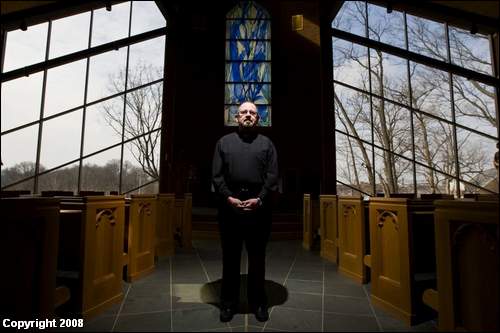Book calls on them to work more closely together
By Peter Smith
The Courier-Journal
February 23, 2008
http://www.courier-journal.com/apps/pbcs.dll/article?AID=/20080223/NEWS01/802230451/1008/NEWS01
It was challenging enough to recruit young men for the Roman Catholic priesthood at a time when few were heeding such a call.
But the Rev. Ronald Knott's job with the Archdiocese of Louisville became nearly impossible when the crisis of sexual abuse by clergy and others in the church hit its peak in 2002 and 2003.
The crisis also threw Knott into the lowest point of his career, a depression he said many priests experienced then. But it got him thinking deeply about how many priests are overworked, isolated from each other and their parishioners and -- in the case of new priests -- poorly prepared for the realities of life as a pastor.
"We will never attract new young guys unless we are happy," he said. With fewer priests taking on more duties, "We can't work much harder than we do. We have to work smarter, as a team."
 |
| The Rev. Ronald Knott said he feels in his "element" working at St. Meinrad School of Theology in Southern Indiana. Knott, who teaches at the school, is trying to address what he says were problems behind the priest shortage of recent decades. Photo by Michael Clevenger |
Knott has published a book on the subject that struck a chord among priests, and he has given talks around the country.
This April, his work will be recognized with a top honor by the National Federation of Priests' Councils.
The Touchstone Award is given annually to someone who supports the life and ministry of priests.
His self-published book "caught fire" among priests, said the Rev. Richard Vega, president of the federation.
"I'm not sure if it coincided with the sexual-abuse scandal, if people were looking to something to move out of the malaise and minor depression," Vega said. "But something happened that kicked all this into a high gear."
The book, "Intentional Presbyterates," calls on priests to work more closely together in an era when the priesthood is more diverse, filled with members of various ethnicities and international groups, and often with more conservative younger priests and more liberal older ones.
The term "presbyterate" refers to a community of priests.
While he is still a priest in the Archdiocese of Louisville, Knott, 63, now has shifted much of his work to teaching at St. Meinrad School of Theology in Southern Indiana, a seminary that trains many future priests from Kentucky, Indiana and beyond.
He aims to address what he says were problems behind the priest shortage of recent decades.
Knott also has founded an Institute for Priests and Presbyerates, which focuses on preparing seminarians for parish life and mentoring priests after they are ordained.
Knott said many new priests experience culture shock when they move from a highly structured seminary environment, with three buffet meals per day and a team of mentors guiding their daily lives, to being cast in the role of spiritual leaders of parishes where they often are living alone and deciding how they spend their time.
In the past, priests might spend up to 18 years as an associate pastor, easing into the leadership role.
But with the current shortage of priests, many are leading more than one parish and they're often "given a key" upon ordination and told, "You're going to go to St. Mary's next weekend. Good luck," Knott said.
In response, the seminary is setting up more practical training programs, even a kitchen where seminarians learn to cook healthy meals for themselves.
Visiting speakers give talks on everything from volunteer recruitment to conducting parish fundraisers to developing the art of living as a public person, where the smallest comment or action can make a big impact.
The seminary also brings in newly ordained priests for four-day workshops where they can discuss how well they've been transitioning into their new roles.
Professors and others even visit parishes of new priests to get a sense of how they're doing.
"Most of them are affirmed," Knott said, but it helps to pinpoint areas where, for example, they could improve in collaborating with women in parish leadership roles.
The institute also is setting up a Web site offering an online support group for new priests.
Knott, who previously led the revitalization of the Cathedral of the Assumption in Louisville and did mission work in an area of Southern Kentucky where there are few Catholics, said he feels in his "element" to be pioneering the work at St. Meinrad.
"To have it validated (by the priest federation) is like icing on the cake," he said.
Any original material on these pages is copyright © BishopAccountability.org 2004. Reproduce freely with attribution.